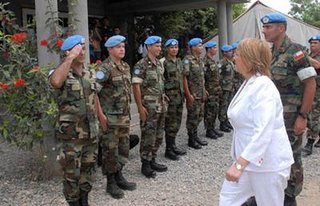
 (10/06/2006) La Presidenta Michelle Bachelet visitó el contingente chileno que forma parte de la Misión de Naciones Unidas para la Estabilización de Haití, Mi
(10/06/2006) La Presidenta Michelle Bachelet visitó el contingente chileno que forma parte de la Misión de Naciones Unidas para la Estabilización de Haití, Mi
(PHOTO SOURCE: Presidencia de la República de Chile)
BACHELET BACK IN CHILE AFTER WHIRLWIND CARIBBEAN TOUR
Meets With Cabinet In Iquique, Salutes Earthquake Relief Effort(June 13, 2006) President Michelle Bachelet returned to Chile on Sunday following a whirlwind tour late last week to Washington D.C, Jamaica, Haiti, and the Dominican Republic.
To counteract criticism by rightist opposition political leaders about the timing of her trip (which fell in the midst of the largest student demonstrations in thirty years), Bachelet immediately convened her cabinet on Sunday in the northern city of Iquique to showcase her work on pending domestic concerns--especially, Iquique’s reconstruction efforts following its June, 2005 earthquake.
Bachelet lauded the reconstruction work, which will be completed in four months, and rejected criticism that the government has taken too long in the rebuilding process. She also dismissed press reports that her travels to the Caribbean were designed to find a graceful exit from competing demands from Venezuela and the United States concerning a vacant temporary seat on the UN Security Council (UNSC) (ST, May 30).
Local media suggested that Bachelet visited Jamaica and the Dominican Republic to persuade one of these two Caribbean nations to be an alternative candidate for the U.N. Security Council position that is now sought by Venezuela and Guatemala. As it now stands, Chile must choose between its regional ally Venezuela, or the U.S.-backed nominee Guatemala. Still, diplomatic sources were quick to quash these rumors.
“Our strategy is to have the best relations with our neighbors and to show them that Chile has been successful in the way it functions,” Bachelet declared in Jamaica, where she was received Friday by President Portia Lucretia Simpson. Simpson, like Bachelet, is the first female president in her country’s history.
Bachelet and Simpson discussed technical cooperation, sugar, the establishment of Montego Bay as a transshipment port and hub for Chilean exports to Europe, tourism, the use of alternative energy and other issues. Both heads of states said their common bond as female presidents helped them cement a strong, personal friendship that transcended diplomatic formalities. “If I have a sister in Jamaica, then you have a sister in Chile,” said Bachelet.
Later Friday Bachelet continued to Haiti, where the UN currently maintains a stabilization mission (peacekeeping) force, Minustah. Chile was among the first to commit troops when violence broke out in 2004, after the ousting of President Jean Bertrand Aristide in February of that year (ST, Jan. 12). The force, which includes 7,300 peacekeepers and soldiers, as well as 1,700 police officers from different countries, includes 600 Chileans (ST, March 14). Bachelet visited the troops and announced that Chile will strengthen its presence in the impoverished Caribbean nation in the form of political, educational, and agricultural assistance.
“President Preval has asked us to cooperate with his team of technocrats and to support his cabinet in their creation of a road map for the government’s next five years,” said Chilean Foreign Ministry delegate Pablo Piñera.
Bachelet concluded her state visits Saturday night when she met with Dominican President Leonel Fern•ndez in Santo Domingo. A close ally of the ConcertaciÛn, Fern•ndez played a key role in electing former Chilean Foreign Minister JosÈ Miguel Insulza as Secretary General of the Organization of American States (OAS). The meeting between Bachelet and Fernandez focused on multilateral politics and the need for “the United Nations and its Security Council be reformed in order to be more effective and to help countries in need.”
Bachelet began her diplomatic tour on Thursday by traveling to the United States where she side-stepped the UNSC nomination polemic and Washington’s highly publicized pressure on Chile to not support Venezuela’s candidacy. Instead, she emphasized human rights issues.
Before meeting U.S. President George W. Bush, Bachelet placed a wreath in the Sheridan Circle in memory of former Chilean Foreign Minister Orlando Letelier. Letelier, who served under Salvador Allende’s socialist government, met a cruel death in Sheridan Circle in September, 1976; a death squad placed a car-bomb in Letelier’s automobile allegedly on orders from Gen. Augusto Pinochet. (ST, June 9).
Later, during their 45 minute meeting, both Bush and Bachelet shared their points of view about achieving world peace and stability. Bachelet said she was satisfied with U.S. political and commercial ties. Bush, in return, lauded Bachelet’s dedication to human rights. The UNSC nomination, they said, was barely touched. “We want to develop the best relations possible with the United Status and its government, and we hope to be successful in this endeavor,” Bachelet said.
SOURCE: LA TERCERA, THE JAMAICA OBSERVER, EMOL
By Matt Malinowski (editor@santiagotimes.cl)
Copyright 2000-2005, All Rights Reserved








